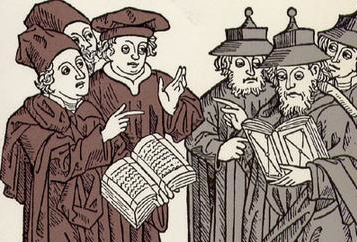
I recently submitted my dissertation proposal for review by an academic committee. I hope that it will be approved without major changes. With that task behind me, I have refocused my attention on transcribing the text-witnesses of Song of Songs Zuta. To do this type of work, I must frequent the Jewish National and University Library in Jerusalem. The world’s best rabbinic scholars use the library for textual research because of its extensive microfilm and Photostat collection of rabbinic manuscripts. Each time that I enter the large rectangular room where scholars can access microfilm, I am grateful for the opportunity to prepare an edition of an ancient rabbinic commentary.
In addition to enjoying this type of work, I obviously have a professional interest in it. Transcribing old manuscripts is foundational to obtaining my doctorate. Yet beyond personal inclination and professional interest, there is another incentive for me to keep working: I derive satisfaction from assisting the Jewish community collate and preserve its literary heritage. Jews and Christians have dueled over interpreting the Bible for centuries. Sometimes their vying became ugly, like when papal agents marred rabbinic texts. I find copying manuscript folios bearing marks of a censor to be both fulfilling and reparative labor. It may also be an effective way for fostering interfaith confidence, friendship and esteem.
The Jewish community treasures its literary heritage. The manuscripts with which I work are rabbinic and not pre-Christian (i.e., they were written centuries after the late Second Temple period). While transcribing, I occasionally encounter material which would benefit a New Testament exegete. My principal interest in rabbinic texts, however, emanates from an esteem of Judaism based on its own terms. I am not principally concerned with profiting as a New Testament exegete or advancing a religious program. I want my relationship with the Jewish community to be one of simplicity and transparency. I offer a helping hand to the Jewish community in a way which I hope that it welcomes and which conceals no stealth.
I am concerned that a lot of Christian activity (particularly conservative Protestant activity in Israel) does not meet these two criteria. For example, there are groups promoting the rebuilding of the temple. Within Judaism, only a radical fringe would welcome this agenda. Even more disturbing, this agenda is birthed out of aspirations to advance a prophetic timetable peculiar to Fundamentalist and Evangelical doctrines. Others are fully engaged in encouraging the emigration of Eastern European and Russian Jews to Israel. Many Israelis would applaud the assistance offered to their coreligionists. However, if the same Israelis were informed about the eschatological program underlying the effort, I suspect that much of the appeal would be lost. Furthermore, Christians who are engaged in Zionistic activity are sucked easily into Israel’s political and ethnic maelstrom. Once this happens, they can no longer aid Israelis in the task for which they desperately need urgent assistance: overcoming the enmity between them and their Palestinian neighbors. These Christians jettison the opportunity to lay themselves down as a bridge of rapprochement between the two peoples, because their actions too often take on a political dimension, or even an anti-Palestinian character.
We are in need of creating new models for serving in the Holy Land. Our models need to reflect sensitivity to the Jewish community. They need to be anchored in Jesus’ teaching about the kingdom of heaven, so as to prevent us from being swept away by polarizing political and ethnic currents. They also need to be birthed out of pellucid motives. The fine print of our programs cannot include ulterior agendas, no matter how inerrant they may seem to us. In essence, we should strive to reapply the Golden Rule: “Do to others as you would have them do to you.” Or if one prefers the rabbinic form of the same aphorism: “What you consider unpleasant, do not do to another.” If I were standing in Jewish shoes, on the one hand, I would welcome succor from those who are sensitive to my history, pains and shortcomings. I also would value assistance in accomplishing what I cannot achieve on my own. On the other hand, however, I would not be thrilled about the actions of someone motivated to help for gain, whether that gain be material or ideological.
As practitioners of Jesus’ teachings, our conduct certainly should be characterized by charity, but a helping hand with strings attached or expectations appended is not pleasant. This constitutes one of the mysterious aspects of the kingdom of heaven. It is The Transparent Agenda, a mandate to do good to all without prejudice and without expectations. In the meantime, I will continue copying worn and marred manuscripts while looking for signs of new thinking in an old land.
































































































